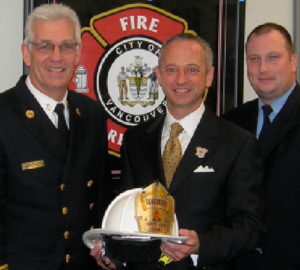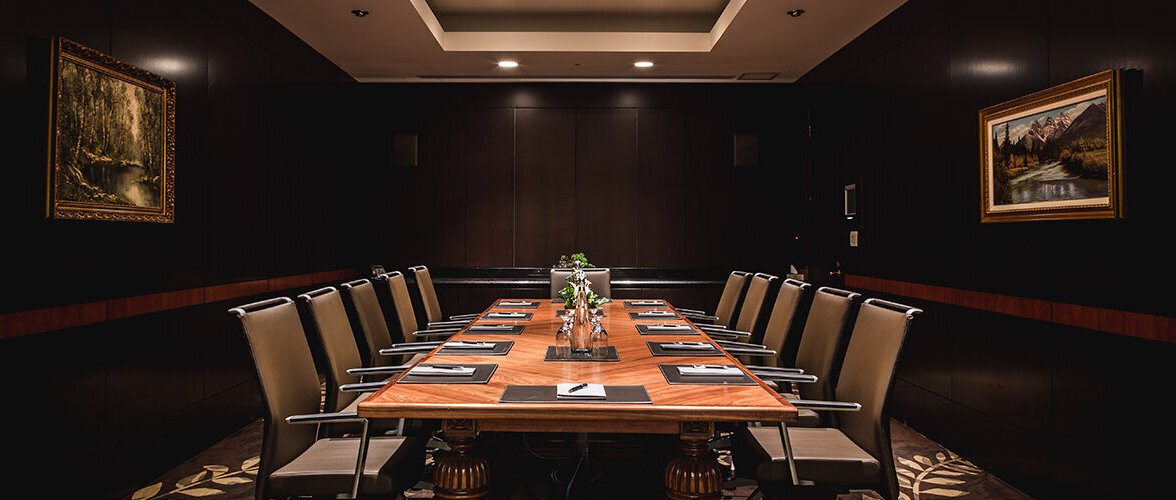Mr. Jeffrey Moore grew up in BC’s “Electric House,” built in 1922 to be the finest showcase of electric potential in the modern home. During a time when most homes might have 10 outlets, this high-tech “smart home” had almost 200. Mr. Moore’s mother bought the Tudor-style home in Shaughnessy when she was 29, and it was their family home for more than 50 years.
During his time studying at UBC, a friend called, beckoning him to join the Bank of Montreal. So, he did. “My life has had so many wonderful zigs and zags,” Mr. Moore says to explain his curious transition from an arts degree to what would become a 35-year-long career in banking. “I have always had the philosophy that you should have a periscope up to look at the marketplace, and that either reaffirms that you are in the right place, or it lets you be aware of other opportunities that might be better.”
Perhaps this cannot be said about too many bankers, but Mr. Moore also leads an extraordinary double life. “One was the working part that paid me money, which I loved, by the way, but I needed this in order to do what I call my heart and soul,” he explains. Mr. Moore’s father was a surgeon who impressed upon his children the importance of healthcare and helping people in need. For more than a decade, Mr. Moore served on the Board of the BC Paraplegic Association, and today, he is active as the Honorary Consul General of El Salvador.
Mr. Moore’s ties with the smallest and most densely populated country in Central America may seem like a stretch; in fact, it’s one that goes back more than 150 years. His mother’s ancestors left Europe in 1852 for the California Gold Rush, but they never made it to the Golden State; they saw so much opportunity when then arrived in Central America, they decided to stay. They started cattle ranching and then began growing coffee in the 1880s. “Seven generations of my family have lived in El Salvador,” Mr. Moore says. “So in 1990, I was asked by the government to be their Honorary Consul. My mandate has always been to represent them with dignity and pride, but also to work on aid and to help people there, as well as the 7,000 Salvadorians who live in the Lower Mainland.” If being named Honorary Consul General of El Salvador was a “zig,” then another fortuitous “zag,” happened shortly after for Mr. Moore, which would result in the co-founding of Firefighters Without Borders Canada (FWBC). A friend of his, a frefighter in North Vancouver, asked Mr. Moore if he might want to take some decommissioned turnout gear (protective clothing) to firefighters in El Salvador. But getting a material gift is one thing; shipping is another,” Mr. Moore says. “By fluke, the national paper in El Salvador was importing most of its newsprint from MacMillan Bloedel in Vancouver at the time. They had their newsprint on ships going down there every 45 days and they said they would always have room for a few pallets of mine.”
After five years of use, fire departments were routinely destroying their turnout gear, adding it to landfill; they wouldn’t give it to volunteer firefighters or send it to other countries for fear of legal liability. The City of Vancouver helped craft a suitable waiver of liability which resulted in more than 100 cities from across Canadaflooding FWBC with decommissioned gear ranging from protective clothing to fire engines; everything has since been saved from destruction by being sent to developing countries in need. In 2012, Mr. Moore helped found the Fire Rescue International Training Association, dedicated to bringing firefighter and public safety to developing countries across Latin America. As are sult of his work with these two organizations, he has been named Honorary Deputy Chief, Vancouver Fire & Rescue Services.
Mr. Moore is also involved in an ambitious undertaking together with the BC Restaurants & Food Services Association, Government of Canada, and the El Salvador government on a temporary foreign worker program. “There are currently 12,000 restaurants in BC and among them, 14,000 vacancies,” explains Mr.Moore. “Restaurants are curtailing their hours or closing completely. They can’t get people to work and resources are wasted on training and orientation because turnover is so high. The temporary foreign workers program will assist the restaurant industry in a very significant way, and there are opportunities in construction as well. There are multiple checks in place, of course. One is a federal document called Labour Management Impact Assessment that verifies that the restaurant has tried in earnest to give jobs to Canadians first. “We must share information thoughtfully to prevent speculation. People are not here to take jobs away from Canadians. There is an undeniable gap that needs to be filled if people want to continue dining out.”
Mr. Moore joined Terminal City Club 28 years ago. “I had always known about the Club as a place with good quality people,” he says. “It was sophisticated and fun at the same time, so I joined! I love the Club. My closest friends are from here, and they are like family to me. I use the gym – it’s good for you mentally and physically – and the camaraderie is great.” When Mr. Moore joined in 1990, the Club was on the verge of a big decision: to tear the Metropolitan clubhouse down and build anew or keep it standing. In fact,his 40th birthday was one of the last functions in the Metropolitan. “It was a beautiful dinnerthat the Club did extraordinarily well. Shortly after that, they auctioned everything off that they knew they weren’t going to keep, and I bought a ton of stuff.”
Over the years, Mr. Moore has been recognized for his incredible community contributions, including the Queen Elizabeth II Diamond Jubilee Medal, Medalla al Mérito Diplomático (Medal of Diplomatic Merit, El Salvador), and the Senate of Canada 150th Anniversary Medal this past May. His full time volunteer work to help people truly comes from his heart and soul; Mr. Moore receives no financial compensation for his efforts, but he is doing what is important to him – nothing less – each and every day. In his words: “I’m grateful for the recognition; that’s nice, but it’s not necessary. For me, it’s all about good people helping good people do good things.”


